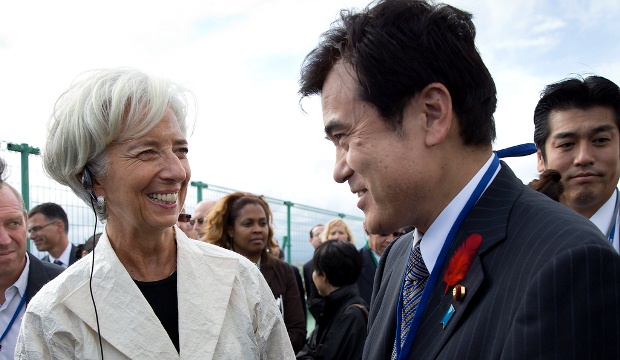By Will Colson & Kate Rustici

Japan?s Minister of Finance Koriki Jojima meets with the International Monetary Fund's Managing Director Christine Lagarde October 10, 2012 in Japan. Japan will provide Myanmar with assistance to clear its arrears with international financial institutions so that it can resume borrowing. Source: International Monetary Fund's flickr photostream, used under a creative commons license.
Japan?s Minister of Finance Koriki Jojima announced October 11 that Japan would extend new loans to Myanmar in an attempt to strengthen the country?s financial standing as it moves forward with economic and political reforms. The announcement followed the ?Meeting on Myanmar in Tokyo? as part of the International Monetary Fund (IMF) and World Bank meetings, beginning October 9.
Tokyo will forgive $3.7 billion of a total of $6 billion loaned to Myanmar, and will use bridge loans worth an estimated $900 million dollars to clear arrears with the Asia Development Bank (ADB) and the World Bank. This will allow Myanmar to resume borrowing from these financial institutions by January of next year.
What this means for Myanmar
Myanmar has not serviced its World Bank loans since 1997, and the World Bank has not issued new loans in twenty five years. Though a comprehensive deal was not reached, it was not expected to be, and the meeting was a crucial step in normalizing Myanmar?s economic standing with major global institutions.? In another development, on October 10 of this year U.S. president Barack Obama signed into law a bill that removes the requirement that U.S. representatives in international financial institutions such as the IMF and World Bank vote against funds and resources going towards Myanmar, further removing some of the last vestiges of sanctions.
Myanmar is in the midst of a dramatic economic and political transformation which has reopened the once pariah state to the world. The Japanese effort to clear Myanmar?s debts will allow the country to receive loans from the ADB and World Bank, which will pave the way for desperately needed development projects. Myanmar is an impoverished country that lags behind its neighbors following decades of economic mismanagement, and is rich in natural resources, which can be a blessing and a curse. While it gives Myanmar an instant advantage in terms of cultivating revenue, if it does not develop economic sectors that encourage widespread job growth, such as manufacturing and agriculture, its economic advantages may only be felt by a select few.
Myanmar requires a significant and coordinated effort to improve its infrastructure before it can be regionally competitive and begin to reach its economic potential. In addition to the bridge loans, Jojima also said Japan would supply additional loans to the country to help with development projects including ports and bridges, improving roads, and rural development that would cultivate broader economic development.
What this means for Japan
Japan is Myanmar?s largest creditor and has led the way both in alleviating Myanmar?s debt and bringing the nascent democracy to the attention of the international community. Japan has maintained an interest in Southeast Asia since the late 1980s, when its aid to the region was nearly seven times that of the United States. While the last 5 years of economic turbulence have seen their numbers fall off somewhat, Japan is still the world?s second largest aid donor, surpassed only by the United States. In the last five years alone, the number of NGO projects in Myanmar supported by the Japanese Ministry of Foreign Affairs has quadrupled. Perhaps most important to the equation is how Japan is getting out ahead of the pack in Myanmar, outpacing the U.S. State Department?s explicit overtures towards investors and other major regional players.
Doubtless, Japan wants to lead the pack in ushering Myanmar into a new era of liberalizing reforms. Studies have shown consistently that assistance from Japan in Southeast Asia is well ahead of that provided by both the United States and China. As Japan struggles with 20 years of sluggish growth, it seems only appropriate that it should also pursue new avenues of investment, and much of Japan?s assistance comes in the form of tied aid. ?While a balance of power calculus might suggest a zero sum game between China and Japan in Southeast Asia, it?s not that simple.? A thriving Myanmar benefits China as much as Japan. Japan likely seeks to prevent Chinese exclusivity, but more importantly to allow access by many countries to an emerging market. ?Japan?s recompense for its leadership is notoriety commensurate with its station. Such influence can only be earned by taking risks. Still, on this account, as some have duly noted, Japan seeks cover from the worst case scenarios which could lead it to draw fire from its support of a volatile transition.
Both countries have much to gain from this process. However, while organizations like the IMF have stressed the paralytic effect of debt overhang, the effectiveness and efficiency of debt relief as a growth mechanism remains under some debate. Myanmar?s transition is remarkable, though incomplete, and no outcome is guaranteed. If economic expectations are not met, it is possible that we will see a reversal of the positive changes, or give hardliners the opportunity to criticize the current, reform minded regime. By giving Myanmar access to the financing it needs to jump-start its economy, Japan is playing a crucial leadership role in ensuring that Myanmar can advance.
Mr. William Colson is a Research Assistant with the Japan Chair at CSIS. Ms. Kathleen Rustici is a Research Associate with the Chair for Southeast Asia Studies at CSIS.
Source: http://cogitasia.com/japan-moves-to-alleviate-myanmar%E2%80%99s-debt/
Katie Ledecky Aaron Ross Sikh temple lollapalooza Nastia Liukin Gabby Douglas hair Kayla Harrison
No comments:
Post a Comment
Note: Only a member of this blog may post a comment.